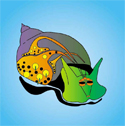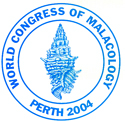
Thursday 4 March 2004
The Linnean Society with The Malacological Society of London
A joint evening meeting on Cephlahod Systematics, Ecology and Fisheries
Burlington House, London, at 5.30 (tea) for 6 p.m.
Presentations by Paul Rodhouse, Louise Allcock and Nadine Johnson
Global imagery
from the US Defense Meterological Satellite Programme together with
innovative technologies such as submersibles and remote operated vehicles
(ROV's) have provided new opportunities to study cephalopod systematics,
ecology and fisheries. Cephalopods are the most highly evolved molluscs,
but these deep living marine animals with their well developed sensory
systems and jet propulsion have been able to avoid most scientific
sampling devices in the past, hindering systematic an evolutionary
studies. Now exciting advances in collecting and identifying species,
together with ecological data obtained from satellite monitoring of
the rapidly developing fisheries, has revolutionized our understanding
of these unique creatures.
The presentations will include a contemporary account of cephalopod
systematics focusing on radiation of the Antarctic octopuses and the
possible role of the Antarctic as a cradle for deep-sea octopus diversity
world-wide. They will examine the cephalopod fisheries to illustrate
how new ecological information has been obtained and how global imaging
has been used to assess the extent of the global light fishery for
cephalopods. Finally, the interactions between the exploited populations
and regional oceanography, and between the fisheries and higher predators
dependent on the cephalopod populations will be discussed.
Organised by: Paul Rodhouse,
British Antarctic Survey, (p.ro...@bas.ac.uk)
and Peter Boyle, University of Aberdeen (p.r....@abdn.ac.uk).
Friday & Saturday, 16-17
April 2004
The Malacological Society of London
Behaviour And Neurophysiology of Molluscs
University of Kingston, Surrey
 |
The behaviour of molluscs has been studied in
a wide range of contexts, including behavioural ecology, the
feeding behaviour of agricultural pests, as vectors of disease,
in studies of learning and memory, and as models for the neurophysiological
bases for behavioural mechanisms. This meeting with participants
from 10 countries, represents an opportunity to examine some
of the latest developments in the study of molluscan behaviour
and neurophysiology.
Organiser: Dr Richard Cook: R.C...@KINGSTON.AC.UK
|
Provisional
List of Speakers
Behaviour:
1.
SER Bailey, University of Manchester, UK
The non-chemical snail: sensitivity of Helix to light and other non-chemical
stimuli
2. A Brooks et al.,
Harper Adams University College, UK
Slug Feeding behaviour and its application to pest control
3.
A-S
Darmaillacq et al., University of Caen, France
The effect of early feeding experience on subsequent prey preference
in cuttlefish, Sepia officinalis
4. L Dickel et al.,
University of Caen, France
Behavioural flexibility and learning in cuttlefish (Sepia officinalis)
5.
J Mather, University of Lethbridge, Canada
Directionally in the skin display system of squid Sepioteuthis Sepoidea
6.
J
Hagnell et al. University of Goteborg, Sweden
Moving towards perfection? Locomotion of large slugs including the
hybrid Arion ater x A. lusitanicus
7.
H
Reise, State Museum of Natural History, Gorlitz Germany
Diversity of mating behaviour within Deroceras, a genus of terrestrial
slugs
8.
R Rabaneda-Bueno et al., Universidad de Granada, Spain
Trio mating formation during copula in the hermaphrodite land snail
Iberus gualtierianus
9.
M
Rajasekharan & T Crowe, University College Dublin, Ireland
Life in the slow lane: dispersal of an intertidal gastropod Littorina
littorea
Neurophysiology:
1. G Banks et al., University
of Sussex, UK
Cellular localisation of the acetylcholine binding protein in the
CNS of the snail Lymnaea stagnalis
2.
D
Brooks et al., University of Rhode Island, USA
Molluscs as models
3. R Chase, McGill University,
Canada
Neutral controls on the release of gametes in Helix aspersa
4. JH Elliott &
A Vehovszky, University of York, UK , & Balaton Limnological Institute,
Hungary
Control of feeding in Lymnaea by octopamine
5. V Flari, Central
Science Laboratory, York, UK
Reviewing the neuroendocrine system that controls reproduction in
terrestrial pulmonate gastropods
6. A Guerra & AF
Gonzalez, Instituto de Investigaciones Marinas, Vigo, Spain
Some inferences about the habits of cephalopods from their brains
7. JS Ireland et al.,
University of Sussex, UK
Investigating the sensory pathways involved in chemical conditioning
Saturday 17 April 2004
The Malacological Society of London
Annual General Meeting
The Society’s A.G.M. will take place in Kingston University,
during the above meeting, at 2 p.m on the 16-17 April 2004. The room
number is 6143 (on the first floor next to lecture theatre) of the
Sir Frank Lampl building, Kingston Hill Campus. Parking is available.
Richard Cook will send directions for travel on request to : R.C...@KINGSTON.AC.UK
Agenda for AGM
!. Apologies for absence
2. Minutes of last (110th)
AGM
3. Matters Arising
4. Financial Report,
including approval of Auditors
5. Annual Report of Council
(delivered by the President)
6. Annual Award
7. Centenary Research
Grant Award
8. Sir Charles Maurice
Yonge Award
9. Election of Council
10. Forthcoming Meetings
11. Any Other Business
6-10 June 2004
Western Society of Malacologists
36th Annual Meeting
Natural History Museum of Los Angeles County
www.nhm.org/research/malacology/avaldes/wsm/losangeles.html
14-18
June 2004
International Conference on Molluscan Shellfish Safety
Galway, Ireland
www.icmss04.com
11-16 July 2004
World Congress of Malacology
Perth, Western Australia
 |
The
Congress starts with an icebreaker on Sunday night, 11th July.
Conference sessions are on Monday, Tuesday, Thursday and Friday,
and the Congress Dinner on Friday 16th. Wednesday tours are: Koalas,
Kangaroos and Sharks at Caversham Wildlife Park and Aquarium of
Western Australia ($60), cruise down Swan River, lunch and Rottnest
Island coach tour ($135), Swan Valley wine and chocolate taste
($60), Dive expedition to Rottnest Island ($120).
Contributed paper sessions all aspects of Malacology. |
Symposia:
1. Phylogeny of molluscs
(Winston Ponder & David Lindberg)
2. Molluscan aquaculture
and fisheries (Fred Wells, Greg Maguire & Lindsay Joll)
3. Ecology of molluscs
(Tony Underwood & Gee Chapman)
4. Medical and applied
molluscs (Jambari Hadji Ali)
5. Special sessions:
6. Bivalves (Rudiger Bieler
& Paula Mikkelsen)
7. Reproduction and development
patterns (Helena Fortunado)
8. Biology and systematics
of opisthobranchs (Gilliana Brodi & Angel Valdes)
9. Population genetics
in the Molluscs (Andrzej Falniowski)
10. Pattern and process
in land mollusc diversity (Robert
11. Cameron & Beata
Pokryszko)
12. Curators’ meeting
(Kathie Way)
Post-congress field trip to Houtman Abrolhos Islands, and post conference
symposium “Biomineralization: Contemporary Perspectives”
Murdoch University, 19-21 July.
Deadline: Accommodation,
30 April; Abstract, 15 June.
Conference fees: Members
$480 (after 1 May $560); non-member $570 ($650), student member $270
($300), student non-member $295 ($325), includes Icebreaker and Conference
Dinner, but excludes accommodation, meals, and tours.
Organised by: Dr Fred
Wells, Western Australian Museum, 1 Francis St, Perth 6000, Western
Australia Fred...@museum.wa.gov.au , phone: 61 8 9427 2809, Fax:
61 8 9472 2882
Updates and further information:
http://www.inter.nl.net/users/Meijer.T/UM/um.html
http://www.amonline.net.au/malsoc
31 July – 4 August
American Malacological Society
70th Annual Meeting
Sanibel Island,Florida
http://www.shellmuseum.org/AMS/
Thursday 4 November 2004
The Malacological Society of London
Molluscan Forum 2004: 10.00am - 5.30pm
Natural History Museum, London
The seventh annual gathering for research and
undergraduate project students, first-time post-docs and amateur researchers
from the UK and abroad.
Calls For Registrations and Papers
This informal, annual meeting is designed to bring together people
starting their research on Mollusc, to give them the opportunity to
present and discuss their work and to compare notes on methods and
problems.
Attendance is open to all, but speakers and poster presenters should
be research students, post-doctoral researchers, undergraduates starting
molluscan projects or dissertations, and amateurs engaged in substantial
projects, which have not yet been published. Any topic related to
molluscs is acceptable: Palenontological, Physiological, Behavioural,
Ecological, Systematic, Morphological or Molecular.
Short talks (15 mins) or posters may be offered.They need not to polished
accounts of the completed work: describing new methods, work in progress,
appeals for assistance with unsolved problems are equally acceptable.
Powerpoint presentations are acceptable, but should be discussed in
advance. In addition to talks and posters there will be opportunites
to acquire reprints contributed by members of The Society. The forum
will end with a wine reception.
There is no registration fee; a limited amount of
help with travel costs will be available for presenters who cannot
claim them from elsewhere.
Last years forum was fully subscribed.
so book early!
Enquiries to: Dr
S.E.R. Bailey, School of Biological Sciences, 3.614 Stopford Building,
The University of Manchester, Oxford Road, Manchester M13 9PT. Tel:
0161 275 3900. Email:
BBAI...@FS1.SCG.MAN.AC.UK
Details of registration at:
http://www.sunderland.ac.uk/MalacSoc
The Conchological Society
of Great Britain and Ireland
Details of Meetings at: http://www.conchsoc.org/events.htm
